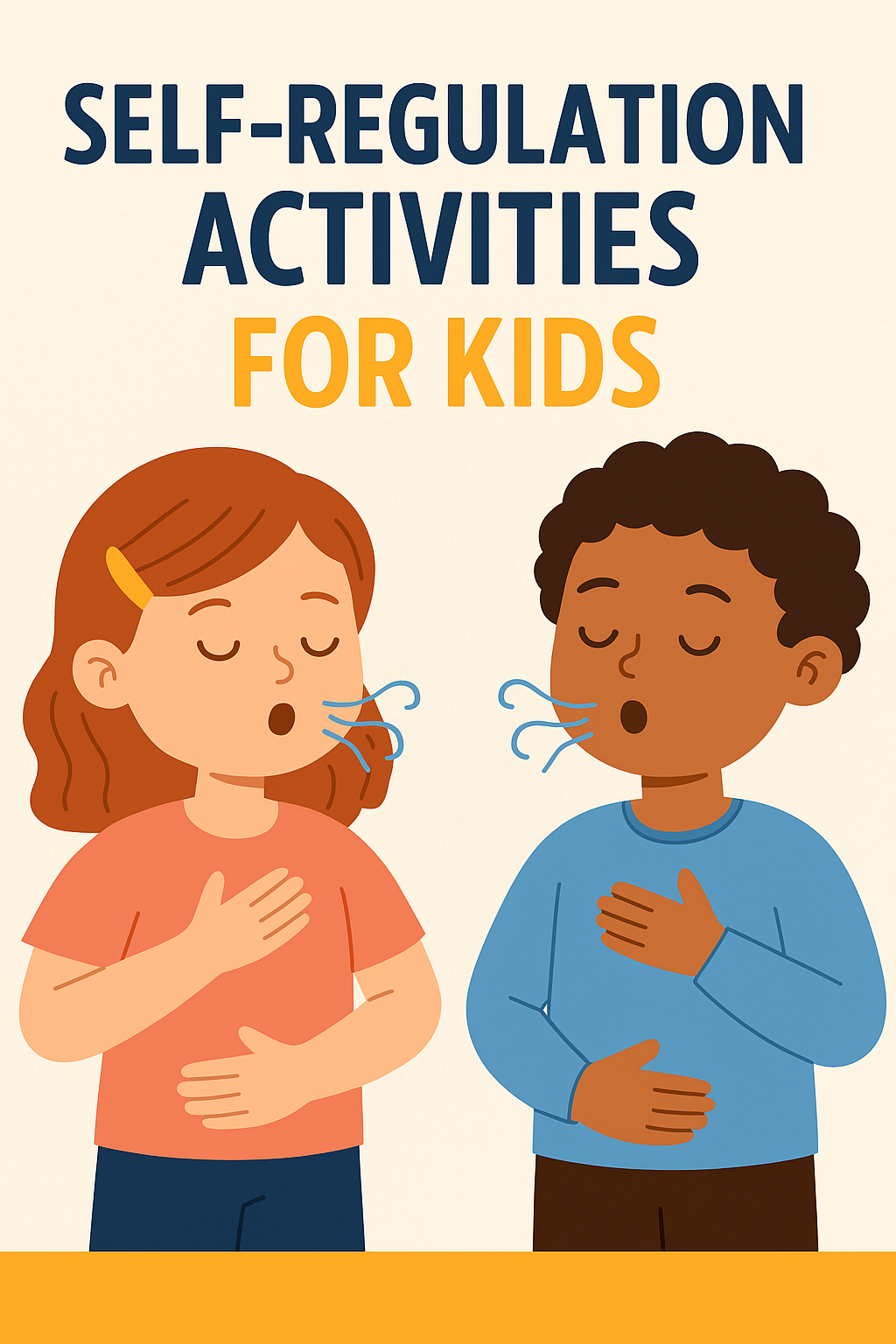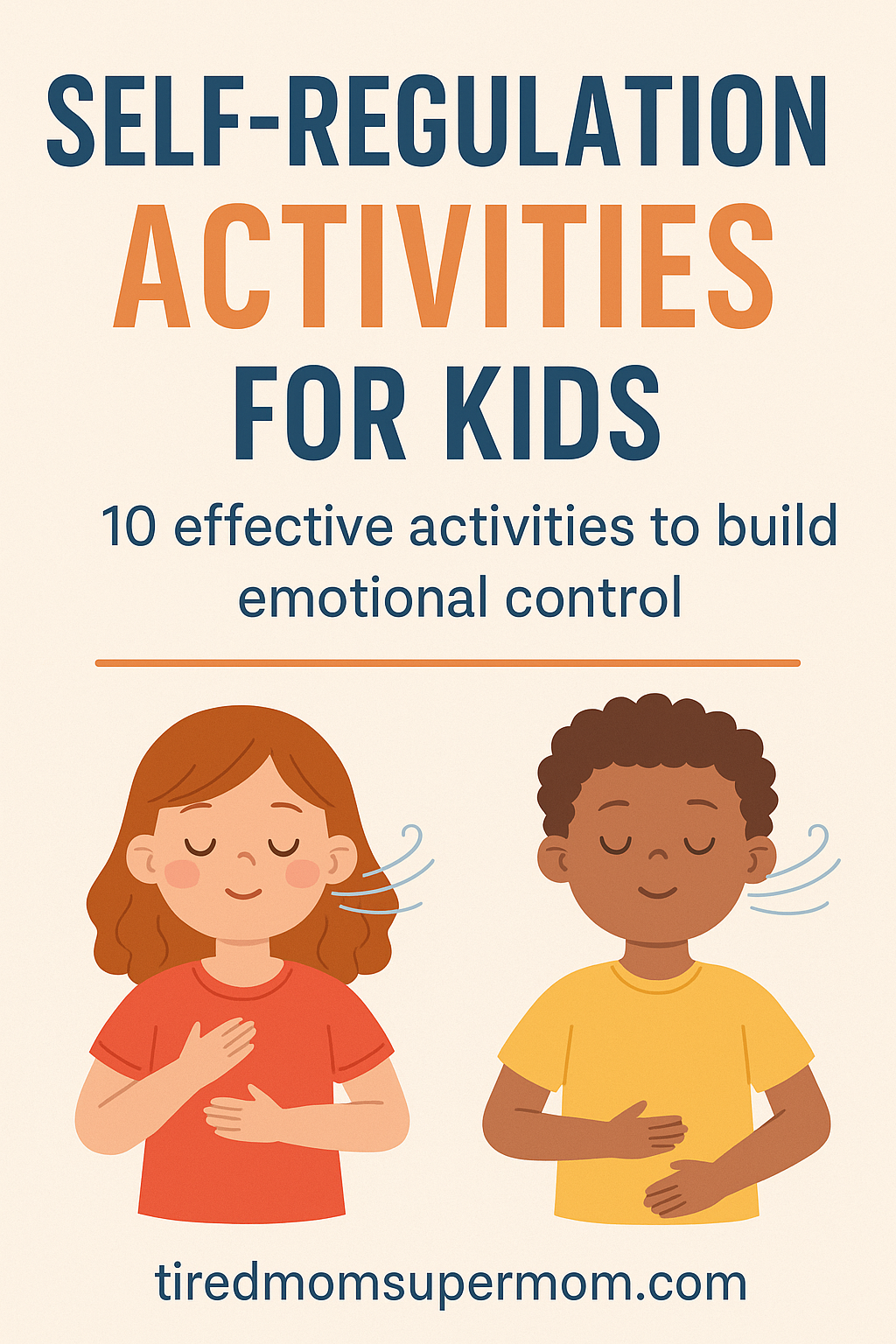10 Effective Self-Regulation Activities for Kids to Build Emotional Control
Helping children develop emotional control is one of the most important roles we have as parents. Self-regulation is the ability to manage emotions, behavior, and thoughts in a way that is socially acceptable and helps achieve long-term goals. It’s a foundational skill for success in school, friendships, and life.
If your child struggles with big emotions or impulsive behavior, don’t worry — these self-regulation activities for kids are simple, fun, and highly effective. You don’t need fancy therapy sessions or expensive programs to start teaching these skills at home.
In this article, we’ll cover:
- What self-regulation is and why it matters
- 10 powerful self-regulation activities for kids
- Tools and resources to make the process easier
Let’s help our kids thrive emotionally!
Heads up: This post may include affiliate links. As an Amazon Associate, I earn from qualifying purchases—at no extra cost to you. Full privacy policy and disclosure here.

What Is Self-Regulation?
Self-regulation is the ability to control one’s emotional responses, impulses, and behaviors. It’s what helps a child wait their turn, walk away from a conflict, or calm themselves when frustrated.
This skill doesn’t come naturally to most children — it’s learned over time through practice and modeling. Some kids need more help than others, and that’s completely normal.
Children who develop self-regulation skills early in life often show:
- Better emotional resilience
- Improved focus and attention
- Fewer behavior challenges
- Stronger social skills
For a deeper dive into parenting with emotional intelligence, check out these positive parenting books that guide you through behavior management with empathy.
10 Self-Regulation Activities for Kids
These self-regulation activities for kids are simple enough to do at home yet powerful enough to build lifelong emotional strength.
These hands-on activities teach emotional regulation in ways children naturally understand — through play, movement, and connection.
1. Mindful Breathing with a Breathing Ball
A Hoberman sphere (aka breathing ball) is a great visual tool for teaching mindful breathing. Expand the ball as your child breathes in and contract it as they breathe out.
This technique helps kids focus on slow, deep breaths to calm their nervous system.
Try This: Check out this bestselling breathing ball on Amazon.
2. Emotion Matching Games
If you’re searching for self-regulation activities for kids that don’t require screens, this list is filled with hands-on ideas.
Create or buy cards with different facial expressions. Kids pick a card, identify the emotion, and describe a time they felt that way. This builds emotional vocabulary and empathy.
Recommended: Feelings flashcards for kids are perfect for this activity.
3. The Glitter Jar Technique
Incorporating self-regulation activities for kids into your daily routine can help reduce meltdowns and increase cooperation.
Fill a mason jar with water, glitter glue, and glitter. Shake it up and have your child watch the glitter settle.
Explain that their mind can be like the jar — swirling with feelings — and calming down takes time. It’s a powerful visual for self-regulation. Get a glitter jar kit.
4. Movement Breaks
Teachers and caregivers can benefit from using these self-regulation activities for kids in classroom settings too.
When emotions run high, physical movement helps reset the brain. Build mini obstacle courses or do jumping jacks and stretches together.
Even 5–10 minutes of movement can help kids regain control and focus.
Related tip: If you’re parenting a high-energy or sensitive child, don’t miss these quick positive parenting tips.
5. Use a Calm-Down Corner
Set up a cozy space with pillows, sensory toys, books, and calming visuals. Let your child go there whenever they feel overwhelmed — not as a punishment, but as a tool.
Weighted stuffed animals can be especially soothing in this space.
6. Yoga and Stretching for Kids
We’ve tested dozens of self-regulation activities for kids, and these 10 have made the biggest impact on emotional control in our home.
Yoga helps kids connect their body and breath. Poses like “child’s pose” or “downward dog” promote calm and control.
Try This: Yoga cards for children offer a playful and easy way to get started.
7. Feelings Thermometer Chart
Create a chart with colors that represent different emotional states — from calm to upset. Have your child point to where they are and what they need to move toward calm.
Pair it with this guide to the 5 love languages for kids to help meet their emotional needs more effectively.
8. Storytelling with Emotion Puppets
Use hand puppets to act out emotional scenarios. Let your child direct the puppet’s response, helping them explore better ways to react.
This activity is especially helpful for younger kids and visual learners.
9. Gratitude Rituals
Teaching gratitude promotes emotional balance. Try a nightly gratitude journal or ask your child to name three things they’re thankful for.
A great companion is this post on what makes a child happy, which dives into the importance of connection and joy.
10. Use Music to Regulate Mood
Create playlists for different moods — calm, happy, energetic. Let your child choose music that helps shift their emotional state.
Bonus: Check out these inspiring parenting quotes to stay grounded as a parent during tough days.
Common Questions About Self-Regulation Activities for Kids
What age should I start teaching self-regulation?
You can start as early as toddlerhood! Toddlers won’t master the skills overnight, but modeling calm behavior and giving them tools (like calm-down corners or breathing games) lays the groundwork.
What if my child refuses to try these activities?
Make it fun and consistent — not forced. Let your child choose from a “calm-down menu” so they feel in control. Over time, these tools become second nature.
Are there any apps or tools that can help?
Yes! Apps like “Breathe, Think, Do with Sesame” are great for young kids. Tools like this emotion regulation workbook for kids are also wonderful resources.
What’s the difference between self-regulation and self-control?
Self-control is more about immediate restraint (not hitting, not yelling). Self-regulation includes recognizing feelings, understanding them, and making healthy choices over time.
How do I know if these activities are working?
Look for progress over perfection. Fewer meltdowns, quicker recoveries, or your child verbalizing feelings more often are all signs of growth.
Final Thoughts: Why Self-Regulation Matters
Self-regulation activities for kids are about more than managing tantrums — they teach children how to handle life. With regular practice, children gain the confidence and skills to manage frustration, focus their attention, and make good choices.
If you’re struggling with behavior challenges, consider this Positive Parenting Solutions course, which offers practical, respectful strategies that work.
By giving our children these tools early on, we’re setting them up for lifelong emotional health.
Pin this post to revisit these ideas later — or download our free printable Self-Regulation Toolkit for your calm-down corner!
Want help getting your quiet child to open up? Don’t miss these tips for encouraging shy kids.

